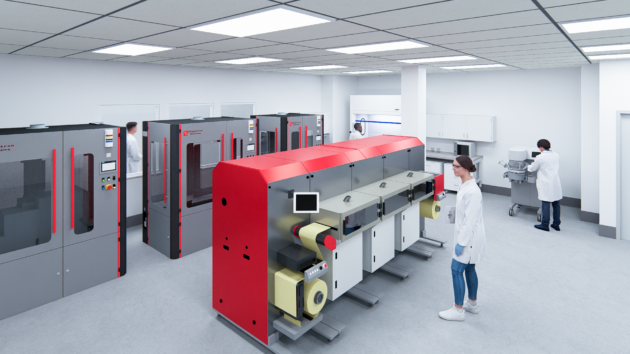
Global entrepreneurs and academics are working hard to push the boundaries of battery innovation in terms of power and performance.
Since its inception in 2017, the Washington Clean Energy Testbeds at the University of Washington has been a hub offering space, tools, and expertise to aid startups, university staff, and students in this pursuit. Today, the facility’s leaders announced plans to establish an open-access lab for validating new technologies by integrating them into custom pouch cell batteries.
“A battery is a chemical system that is highly engineered so that all the parts work together,” said Dan Schwartz, founding director of the UW’s Clean Energy Institute, which incorporates the testbeds. “And the nation is really under-invested in that kind of engineering work.”
Researchers often focus on optimizing one aspect of a battery’s system, like an anode’s chemistry. To demonstrate a solution’s overall effectiveness, it’s crucial to show its performance alongside other components.
The new lab will provide the essential infrastructure to unify these efforts.
The facility will feature a dry room and equipment for making electrode slurries, coating electrodes, and assembling battery parts. Batteries will be created in pouch-like plastic-lined aluminum, similar to a Pop Tart package.
While beneficial for experiments, pouch cell batteries are commercially applicable in electric vehicles and consumer electronics. Schwartz noted that there’s an increasing demand for pouch cell batteries in heavy trucking and aviation.
“Flexibility exists to create designs optimized for various use cases,” he stated. “And this is at a scale where testing is feasible.”

The new 1,600-square-foot lab expansion will involve adapting a storage area within the existing 15,000-square-foot testbed facility situated just east of the UW’s main Seattle campus, set to open next summer.
The $7.5 million project is funded through the state’s Climate Commitment Act, a program for clean energy transition that risks elimination if Initiative 2117 passes next month.
There’s a high demand for these resources, Schwartz indicated. Over seven years, 150 clean tech firms have utilized the testbeds for advancements in batteries, solar energy, the electrical grid, and other technologies. Notable battery alumni are Group14 Technologies and Ecellix, which have pioneered silicon-carbon materials to supplant graphite in battery anodes.
“These new prototyping capabilities at the Testbeds are filling a critical need for battery innovation infrastructure in the U.S.,” said Rick Luebbe, Group14’s CEO and co-founder, in a statement.
Group14 has raised over $650 million from investors, aiming to establish in Eastern Washington the world’s largest silicon anode materials manufacturing facility.
As battery businesses expand, there’s increasing demand for skilled professionals. The UW is launching a Graduate Certificate in Battery Engineering in January, including workshops at the Testbeds and being offered to two-year school students across Washington.
In a few years, the entire Clean Energy Testbeds will relocate to a new building called Brightwork, as part of a larger UW initiative called the Portage Bay Crossing. Construction was expected to begin this year and complete in around two years, but developers have yet to break ground.
Schwartz mentioned that their labs are designed for easy relocation. With rising demands for improved batteries, the pouch cell lab couldn’t wait for the new building.
“This is a field that can’t go slow,” Schwartz emphasized.




